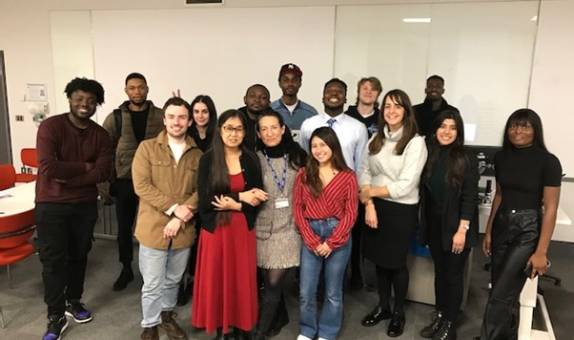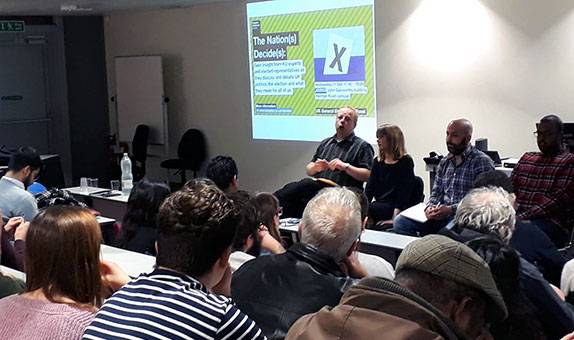International Relations MSc
Why choose this course?
This course explores the development of international relations and the key ideas that have shaped our understanding of the modern system. You will examine institutions, such as the United Nations and the European Union, and study debates concerning security, globalisation and underdevelopment.
With an emphasis on the application of theoretical understanding, such as global conflict management and human rights promotion, this course will suit you if you are seeking to add an international aspect to your specialism.
You will be equipped with enhanced research skills which will be widely applicable in a range of careers. This course also nurtures your critical thinking by encouraging you to engage with your own investigation.
Lively discussion is encouraged, and you'll be able to attend lectures with visiting speakers, leading academics and figures from human rights and international organisations. You will also take part in organisation visits and coordinating the annual Human Rights Festival.
| Mode | Duration | Start date |
|---|---|---|
| Full time | 1 year | September 2024 |
| Part time | 2 years | September 2024 |
| Main Location | Penrhyn Road |
Reasons to choose Kingston University
- Lively discussion is encouraged, with visiting speakers, leading academics and figures from human rights and international organisations. Recent speakers include the Palestinian and EU ambassadors to the UK.
- You will be taught by highly-acclaimed academics and experts in international relations, politics, human rights and international conflict.
- Teaching for the course employs innovative and inclusive methods, including games and simulations, case studies, workshops, role playing and group work.
Specialist careers support
You will take part in an Assessment Centre Experience, providing the opportunity to experience the pathway to employment with tailored feedback to help develop your employability skills for the world of graduate employment.
- Develop your understanding of the jobs market, including current trends and opportunities, different recruitment processes and how to identify relevant roles
- Receive personalised feedback reports to help you to improve and progress
- Access additional webinars on top tips, employer expectations and best practice

Kingston's Department of Criminology, Politics and Sociology
What you will study
You will explore the development of international relations and the key ideas that have shaped our understanding of the modern system. You will learn about actors and institutions such as the United Nations, the United States and the European Union, and you will study theoretical and policy debates concerning globalisation and underdevelopment.
You will have the opportunity to take an in-depth look at issues of human rights and international conflict. Your dissertation will enable you to study an area of interest in depth.
Core modules
Core modules
Dissertation
60 credits
The masters programme culminates in the dissertation, an extended project that allows you to engage in independent research, applying and developing the content of the taught modules to a topic of your choice.
You will complete your dissertation in the summer months, and you will be supported by your supervisor with an emphasis on independent research.
Examples of past dissertations include: ‘Gendering Mary Kaldor's New War Thesis', ‘Foreign Policy of States with Limited Recognition Case Study of Abkhazia', ‘Economic Partnership Agreements in Africa' and ‘Japan's National Security Strategy 2022: A neorealist analysis'.
Research Skills and Dissertation Proposal
30 credits
This module will develop your independent research skills in the field of International Relations. You will explore key approaches to research and experiment with them, enhancing your data literacy in preparation for your dissertation.
Gaining greater data literacy will improve your awareness of how people in research and practical politics use and abuse data. In an era of fake news and conspiracy theories it is more important than ever to look behind the claims made; evaluate the quality of the evidence provided and how it has been used (good data can be used badly, deliberately or otherwise); and separate facts from fiction.
The module culminates with a detailed dissertation proposal, and you will be supported to produce a clearly articulated and fully justified research plan.
The Theory and Practice of International Relations
30 credits
This is the core module for the MSc in International Relations.
The module explores a number of the leading theories that have been put forward to explain how the international system operates, and you will apply these theories to a series of case studies. This combination facilitates the exploration of international relations through the practical application of theoretical standpoints.
In the first part of the module we will explore the key thinkers, ideas and philosophies underpinning the study of international relations from both traditional and critical schools.
In the second part we apply the theories explored in Part 1 in a series of practical workshops, including simulation and role play as well as student-led international relations case studies, both historical and contemporary.
Conflict Analysis and Management
30 credits
The module introduces different approaches to the question of conflict analysis and management in the contemporary world from two angles.
Firstly, drawing from a range of theories of and approaches to conflict analysis and conflict management, the module equips you with the tools to understand and analyse a variety of conflicts.
Secondly, you will explore the connection of theory and practice through a series of case studies from real-world events. Case studies covered include: tension in the South China Sea, independence referenda in Scotland and Catalonia, climate change and conflict, Northern Ireland Peace Process and nuclear deterrence.
Human Rights in Context
30 credits
From the origins of human rights discourse there has been a struggle for women to be seen as equal. Patriarchal societies and laws made by men to benefit men left women fighting for recognition to equal rights and protection under the law, from voting rights, the ability to own property and the right to work.
The concept of universalism in international law and prevailing concepts of non-discrimination have gone far in ensuring formal equality between the sexed under the law. However, there are still many areas in which the struggle is ongoing; from human rights law to family law, medical law to criminal law and employment law there are a multitude of scenarios in which women's rights fall short.
This module examines some of these core areas where the law has a significant and profound impact on women, examining the rationale behind these areas of legislation/regulation and analysing the impact that they have on women.
The overarching concept in this module is addressing whether women are, in the eyes of the law and society, equal by taking a critical approach to the areas examined while also addressing the underlying socio-economic factors that contribute.
Please note
Optional modules only run if there is enough demand. If we have an insufficient number of students interested in an optional module, that module will not be offered for this course.
Kingston School of Law, Social and Behavioural Sciences
The School offers courses in economics, sociology, law, psychology and criminology. Our degrees are underpinned by a vibrant research culture and delivered by a blend of practitioners and academics who are dedicated to equipping you with the employability skills to thrive in your career.
You will have a wealth of opportunities outside the classroom to further your learning and gain hands-on experience in your chosen field.
Life on the course
After you graduate
This course can help you start or develop a career in research, advocacy and policy, for non-governmental organisations (NGOs), diplomatic services, inter-governmental organisations think tanks or in journalism.
Entry requirements
Teaching and assessment
Who teaches this course?
You will be taught by an experienced teaching team whose expertise and knowledge are closely matched to the content of the modules on this course. The team includes senior academics and professional practitioners with industry experience. The following group of staff members are currently involved in the delivery of different elements of this course. This pool is subject to change at any time within the academic year.
Fees for this course
Additional costs
Depending on the programme of study, there may be extra costs that are not covered by tuition fees which students will need to consider when planning their studies. Tuition fees cover the cost of your teaching, assessment and operating University facilities such as the library, access to shared IT equipment and other support services. Accommodation and living costs are not included in our fees.
Where a course has additional expenses, we make every effort to highlight them. These may include optional field trips, materials (e.g. art, design, engineering), security checks such as DBS, uniforms, specialist clothing or professional memberships.
Course changes and regulations
The information on this page reflects the currently intended course structure and module details. To improve your student experience and the quality of your degree, we may review and change the material information of this course. Course changes explained.
Programme Specifications for the course are published ahead of each academic year.
Regulations governing this course can be found on our website.








